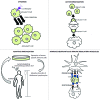Melanoma immunotherapy
- PMID: 24651672
- PMCID: PMC4049781
- DOI: 10.4161/cbt.28555
Melanoma immunotherapy
Abstract
Immunotherapy is a cornerstone in the treatment of melanoma, and is intended to modulate the host immunity against the tumor. Immunotherapy can be used in an adjuvant setting, after complete surgical excision in patients with a high risk of disease relapse and as a treatment in advanced (unresectable or metastatic) stages. Development of novel therapeutic approaches and the optimization of existing therapies hold a great promise in the field of melanoma therapy research. Different clinical trials are ongoing, and immunotherapy is showing the ability to confirm durable clinical benefits in selected groups of melanoma patients. The aim of this review is to summarize different types of immunotherapy agents, as well as to discuss different strategies, complementary regimens, and possible biomarkers of response to the treatment.
Keywords: CTLA-4; PD-1; anti-PD-1; immunoprofiling; interferons; interleukins; ipilimumab.
Figures
References
-
- Quaglino P, Marenco F, Osella-Abate S, Cappello N, Ortoncelli M, Salomone B, Fierro MT, Savoia P, Bernengo MG. Vitiligo is an independent favourable prognostic factor in stage III and IV metastatic melanoma patients: results from a single-institution hospital-based observational cohort study. Ann Oncol. 2010;21:409–14. doi: 10.1093/annonc/mdp325. - DOI - PubMed
-
- Atkins MB, Kunkel L, Sznol M, Rosenberg SA. High-dose recombinant interleukin-2 therapy in patients with metastatic melanoma: long-term survival update. Cancer J Sci Am. 2000;6(Suppl 1):S11–4. - PubMed
-
- Di Giacomo AM, Calabrò L, Danielli R, Fonsatti E, Bertocci E, Pesce I, Fazio C, Cutaia O, Giannarelli D, Miracco C, et al. Long-term survival and immunological parameters in metastatic melanoma patients who responded to ipilimumab 10 mg/kg within an expanded access programme. Cancer Immunol Immunother. 2013;62:1021–8. doi: 10.1007/s00262-013-1418-6. - DOI - PMC - PubMed
Publication types
MeSH terms
Substances
Grants and funding
LinkOut - more resources
Full Text Sources
Other Literature Sources
Medical




